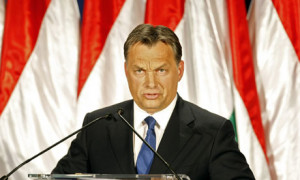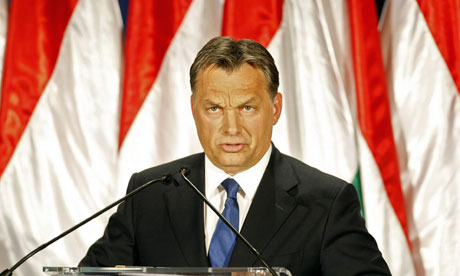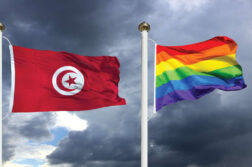
This was the scene in Budapest this month: The World Jewish Congress took the extraordinary step of holding its quadrennial conference in support of the local Jewish community after recent anti-Semitic incidents in Hungary. Some 500 people attended the events. The far-right organized demonstrations against them. The Prime Minister, Viktor Orban, cleared his schedule to speak at the opening. Anti-Semitism, he proclaimed, is “unacceptable and intolerable” and there is a “moral obligation to declare a zero tolerance policy against it.”
This was the scene in Budapest in June 2012: The European Gay and Lesbian Sports Federation took the extraordinary step of holding their Eurogames events in support of the local GLBT community after recent anti-gay incidents in Hungary. Some 3,000 people attended the events. The far-right organized demonstrations against them.
Unfortunately, the parallels stop there.
The Prime Minister did not take time to appear at the Eurogames. No Budapest official spoke about tolerance. In fact, months earlier, Berlin’s mayor Klaus Wowereit wrote a letter to Budapest’s mayor to encourage support and recognition of Eurogames. Budapest’s mayor Istvan Tarlos replied, in part: “I respect their rights, but I don’t want to contribute to the work of the organization. I, as the mayor and a private person, distance myself from this represented lifestyle and also from this event, thus I can’t support it.”
And he didn’t. Without the city’s involvement in the planning, the events were forced to the outskirts of the city, under heavy-lockdown, with little official acknowledgment. Some attendees considered the security excessive and counterproductive to the goal of increasing GLBT visibility. Most Budapest organizers considered the security necessary given that recent Budapest Prides have been violently attacked by a growing neo-Nazi movement. Budapest police, to their credit, have increased their vigilance and efforts to ensure public safety for everyone, and did thwart at least one planned attack on Eurogames.
Pause for a moment to consider a reversal of these two stories: If the Budapest mayor had given a cold-shoulder to the Jewish conference, what public outcry would had been heard? Government officials recalled? Tourism dollars lost?
Contrast Hungary’s neglect of Eurogames to Belgium’s embrace of Outgames, to be held July 31 through August 11 of this year, in Antwerp, and you’ll see the great divide between Eastern and Western Europe on GLBT issues.
Antwerp’s representatives attended Budapest’s Eurogames last year, wearing their bright red T-shirts to promote Outgames. Louise Bettens, one of those representatives from Belgium, was dismayed when told about Budapest officials’ disengagement from the events: “I would be embarrassed for my city if Antwerp’s mayor wrote a letter like that regarding Outgames.”
“It’s politics, of course, when such things happen,” she continues when asked how she would react. “But people can’t blame politics for everything. Individuals need to recognize their role to make changes, and organize well to do so.”
The challenge now for Hungary’s GLBT community, notorious for infighting, is whether it can rise to the occasion and do the hard work of alliance-building, so that its next event will not be officially shunned but, like this month’s Jewish conference, welcomed.







Discussion1 Comment
This a fascist government and if not for the EU,Gays would be no better off than in Russia.